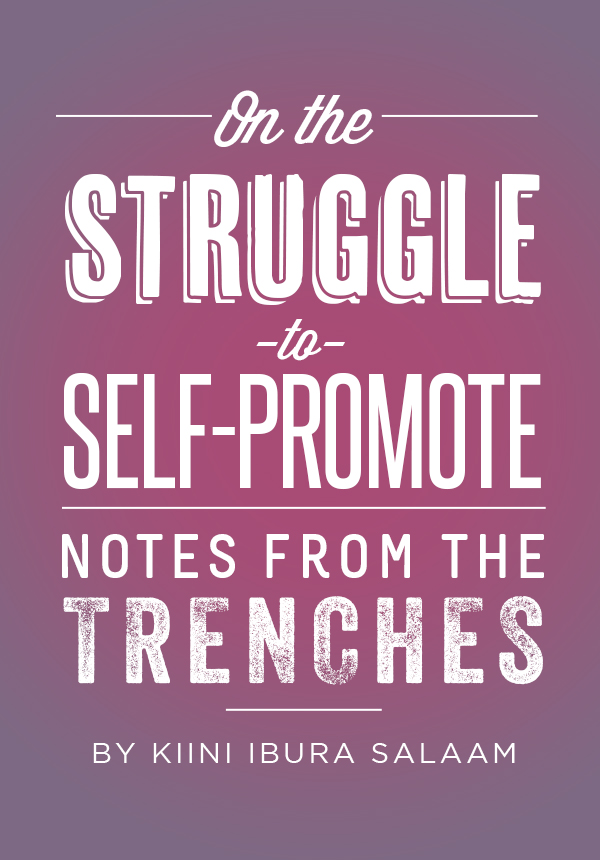From On the Struggle to Self-Promote by Kiini Ibura Salaam.
Promoting your work relies on a willingness to be uncomfortable, and to put your small self in service of a larger vision for your work.
For artists who want to do more than make art in their room, artists who want artmaking to be a career and a way of life, self-promotion is a necessary act. It is also an irritant, a burden, and an exhausting merry-go-round. Some of us artists are blessed with gregarious personalities, with the instinct and the need to be seen, but there are just as many of us—if not more—who prefer to let the work speak for us.
I have never wanted to be the face of my work. The amount of self-talk that an average person engages in during a conversation can feel like oversharing to me. I come by it honestly. My family—though very proud—isn’t given to bragging. My father hates it when people list his achievements. He’s been known to jump on stage and shoo people off before they’ve finished announcing him. If they veer into a long list of his accomplishments, he nudges them away from the podium and launches into his presentation.
All of that to say, self-promoting has never come naturally to me. Over the course of my career, I’ve had to persuade myself that hiding out is not a viable way of being for someone who wants writing to be front and center in her life. The only way I’ve been able to make that shift is to redefine self-promotion as an act of sharing, as an act of honoring my work. I’ve had to convince myself that it’s not about me—it’s about the work.

I remember I was in a Haitian dance class once, and at the end of the dance class, they had a circle for everyone to come in the center and freestyle. I had grown up dancing, and would love to learn choreography. I would perform the choreography with enthusiasm in class—but when it was time to improvise a solo in the circle, I would always hang back and never dive in. I did not want the spotlight to be on me. Anyway, in this Haitian dance class, no one came forward. The teacher stopped the drums and yelled at us. “This is not about you,” he said. “This is not about what you look like or how good you can dance. This is about honoring the drums and honoring the history, the culture, and our ancestry. So when these drums start, I want everyone to take a turn in this circle. You jump in and you surrender. You serve the drums.”
Well, isn’t that ironic? Success in the spotlight requires that we show up to represent something larger than ourselves. Self-promotion isn’t about “me, me, me.” It’s about the value of the artwork, it’s about presence and message, and it’s about representation. It’s also about standing up and being a part of the conversation.
When I don’t keep the expanded purpose of self-promotion in mind, I often feel as if I’m begging for attention or trying to convince someone of my merit. I start to feel oppositional and burdened. Why can’t the work speak for itself? Why can’t the work find its own audience? Why do I have to risk overexposing myself just to give my work a stage?
It seems that the deepest difficulty of self-promotion is navigating fear. We don’t know who is going to respond positively to our work, and we fear no one will. We don’t know what outreach will be effective, and we fear that anything we try will be useless. We fear that we can’t actually live up to our own hype. We want to *know* exactly what our efforts will gain us before we take a leap and advertise ourselves.
Ultimately, I know I’m most successful when I can envision self-promotion as part of my artist’s journey. We each are unique iterations of the artistic impulse and by showing up and representing our work, we build a larger space for our unique expressions—and the unique expressions of others like us.

There’s no magic formula and no foolproof method. The bare bones of it is that self-promotion starts with showing up. To promote your work you must be willing to be uncomfortable. Self-promotion requires you to meet new people, engage in new situations, and be appreciated, challenged, and sometimes misread. Can you be still in the presence of the gaze of others? When looked at from the lens of the individual, it can feel like it’s too much to deal with, but when looked at from the lens of the work, it is clear that every time you share your efforts, you are clearing space for the work. It’s not about you, per se. It’s about putting yourself at the service of your message so that you can widen the sphere of souls that can connect with, be aware of, and be influenced by your creative output. Your work is part of what’s divine about you, and it’s so worth the blood, sweat, and tears of promotion to secure a place for your creative efforts on this earth.
Kiini Ibura Salaam is a writer, painter, and traveler from New Orleans, Louisiana. Her short story collection Ancient, Ancient—winner of the 2012 James Tiptree, Jr. award—contains sensual tales of the fantastic, the dark, and the magical. Her Notes From the Trenches ebook series collects essays about the writing life. Her micro-essays on writing can be found at www.kiiniibura.com.


